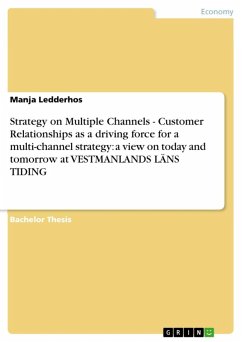
Strategy on Multiple Channels - Customer Relationships as a driving force for a multi-channel strategy: a view on today and tomorrow at VESTMANLANDS LÄNS TIDING (eBook, ePUB)
Sofort per Download lieferbar
14,99 €
inkl. MwSt.

PAYBACK Punkte
0 °P sammeln!
Bachelor Thesis from the year 2003 in the subject Business economics - Offline Marketing and Online Marketing, grade: A (ECTS Credits) , VG (Schwed.), Mälardalen University (Department of Business Studies and Informatics), course: Scientific Method and Undergraduate Thesis in Business Administration, language: English, abstract: In today's world, companies are part of a complex environment, and to cope with uncertainty is the main problem of strategic management. At the latest with the change from seller to buyer market in the 70s, companies cannot see themselves apart from their surroundings...
Bachelor Thesis from the year 2003 in the subject Business economics - Offline Marketing and Online Marketing, grade: A (ECTS Credits) , VG (Schwed.), Mälardalen University (Department of Business Studies and Informatics), course: Scientific Method and Undergraduate Thesis in Business Administration, language: English, abstract: In today's world, companies are part of a complex environment, and to cope with uncertainty is the main problem of strategic management. At the latest with the change from seller to buyer market in the 70s, companies cannot see themselves apart from their surroundings, and no company exists in isolation. A world has emerged in which converging technologies and markets, swirling competition, and innovation can outdate established industry structures overnight. In the past, the world of business was neatly divided into primary, secondary and third sectors while today, the third sector cannot be seen apart from the others. Service becomes more important as time perceives. This orientation leads companies into the understanding that interdependencies with their customers determine the organisation, in which resources, activities and actors are linked to each other. The focus on customers grants at least some stability in the fast changing environment of companies. However, the customers react to environmental changes and put challenging demands on their suppliers. Especially new information technology is a driving force for relationships but asks for the demanding task to contribute information on multiple channels at the same time. The Boston Consulting Group (BCG) notes, "the online channel has a profound influence on consumer's behaviour". Especially the internet has revolutionized customer relationships and "the revolution is far from over". Businesses have become more multifaceted through the developments in the information and communications technology - the internet, mobility and multimedia. Many authors see a digital revolution taking place today and stress that this is a driving force behind many changes in companies. Businesses cannot afford to ignore digital influences and have to make it a leading priority during the next half-decade. Therefore the terminology "Multichannel" seems to be "one of the hottest topics in Europe" where different alternatives of channels should lead to a cohesive whole. When the "digital revolution" is considered in the strategy of companies, planning tools of the past decades seem not sufficient, and even misleading. While changes in the technology are certain, their exact form is unclear. In those dynamic conditions, managers need to consider the environment of the future, not just of the past and the emphasis for planners should change from forecasting to foresight.
Dieser Download kann aus rechtlichen Gründen nur mit Rechnungsadresse in A, B, BG, CY, CZ, D, DK, EW, E, FIN, F, GR, HR, H, IRL, I, LT, L, LR, M, NL, PL, P, R, S, SLO, SK ausgeliefert werden.













